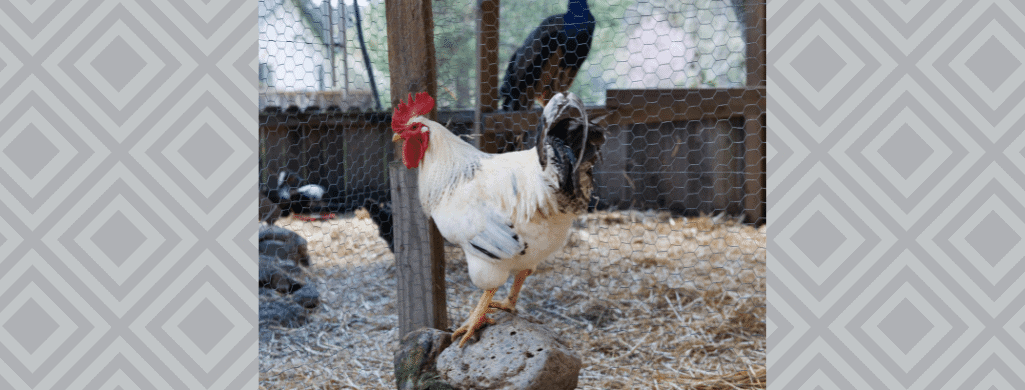Delaware chickens are dual-purpose birds that we love mostly for their impressive meat production.
But will they fit in with the rest of your quiet chickens?
Are Delaware chickens noisy and loud?
Delawares are not especially loud chickens. In fact, these heavy meat birds are often raised strictly as broiler chickens. This means they don’t even sing the egg song as much as others in your flock of birds.

Table of Contents
ToggleHow Loud Are Delaware Chickens?
Delawares do not tend to make a huge racket.
Even for chicken keepers raising them as dependable dual-purpose chickens, there are rarely noise complaints.
This is partly because Delaware birds prefer to spend time foraging and minding their own business.
Delawares will sing the egg song when kept as layers, just like other hens.
However, they don’t make much noise outside of this.
As a general rule, the Delaware is a calm and friendly chicken.
More nervous and flighty birds might squawk all the time. But these girls are likely to stay cool, collected, and quiet.
For reference, we like to compare them to the Barred Plymouth Rock.
Are Delaware Chickens Quiet?
When properly cared for, Delaware chickens are generally quiet birds.
In fact, an agitated Delaware is a cause for some concern.
Here’s what your birds need to thrive:
- Lots of space to forage
- Larger size coop
Aside from the obvious layer feed and water, Delawares needs extra space inside and outside the coop.
Not only is it their instinct to forage, but this gentle breed is also naturally larger than some.
You need to make sure your nesting boxes are big enough for them.
Your whole backyard flock will benefit from spending time outside foraging. But for Delawares, it’s a necessity.
If you force any kind of chicken to stay inside constantly, they get irritated and loud.
Even the quietest birds have difficulty staying calm in these conditions.
Free-ranging chickens is one great way to combat noise.
In rare instances, weather can affect their noise levels.
Further Reading: Are Delaware Chickens Heat Tolerant?

Are Delaware Roosters Loud?
Delaware roosters are not particularly loud compared with other breeds.
But they do still have those natural instincts to crow sometimes.
One of the main frustrations people have with roosters is early morning crowing.
I’ve been there, and it isn’t fun waking up at 4 am to a noisy bird.
But it’s natural for a rooster to crow a couple of times a day, and fighting this instinct isn’t productive or healthy.
Instead, we have tips for working with your birds’ instincts and lowering the noise level.
- Coop light and timer
- Covering windows
Quieting Down Your Flock
All these solutions aim to control the environment, not the chickens themselves.
We know our roosters crow in the morning in reaction to the first light. So, install a light in your coop and put it on a timer.
This way, you control what time your chickens wake up and begin to squawk.
We like this chicken coop light on Amazon.
Some people have problems with this light quitting after six months or a year. Charging consistently isn’t always enough to keep it going.
So, be ready to replace a light like this every year or two.
It is pretty inexpensive, though, and not difficult to replace.
Not to mention, it keeps your hens quiet in the summer and laying in the winter. By the increase in Delaware chicken eggs alone, the light eventually pays for itself.
Now, for this coop light to effectively change your birds’ wake-up time, you need to cover the windows.
In the summer, it’s best to use an easily removable cover.
Some people put shutters on the coop windows. Some people simply hang bedsheets on nails.
The goal is to block out the natural light before you, and your neighbors are ready to get up for the day.
When you feed your birds, remove the cover and let them out of the pen.
In the winter, it’s sometimes best to leave the cover on at all times for the sake of insulation.
With the timed light in the coop, your birds will get the light they need anyway.

Raising Delawares in a Town Setting
I have a lot of respect for anyone who raises their lovely birds in an urban setting.
Living in a town or city with your own backyard flock is tough!
Noise pollution causes more problems with neighbors. But the noise of traffic or neighbors is often distressing to chickens as well.
Even notoriously hardy birds struggle in this setting sometimes.
Here’s why your Delawares might get loud if you’re an urban farmer:
- Not enough space
- Fear of predators
A good rule of thumb is to provide 4-5’ feet of coop space per chicken.
This is hard to pull off in rural areas, so it’s even more difficult in a city. If this just isn’t realistic for you, raise smaller breeds.
Barred Plymouth Rocks, Delawares, and Orpingtons are all good layers and a good source of meat. But they will not do well if crowded.
Remember, chickens are prey animals. They get stressed when they believe there is a predator nearby.
For this reason, the noise level of a town or city often makes chickens tense.
An adaptive flock of birds will adjust to the noise level over time. But be patient and expect some stress responses.
This includes squawking, lower egg production, and flighty or nervous behavior.
Related Post: How long does it take for Delaware chickens to mature?
A Quiet, Lovely Breed
In a mixed flock, Delaware chickens are one of the quieter breeds.
Their calm personalities mean very little nervous squawking or fighting.
Like Barred Rocks or Orpingtons, Delaware hens sing the egg song and otherwise keep quiet.
When their noise level increases, make sure they have lots of space.
If it isn’t a problem with stress, your birds are probably just following their natural instincts by crowing at daybreak or singing the egg song.
Get a coop light to stop early morning crowing, and be sure to cover windows over night.
How useful was this post?
Click on a star to rate it!
We are sorry that this post was not useful for you!
Let us improve this post!
Tell us how we can improve this post?
